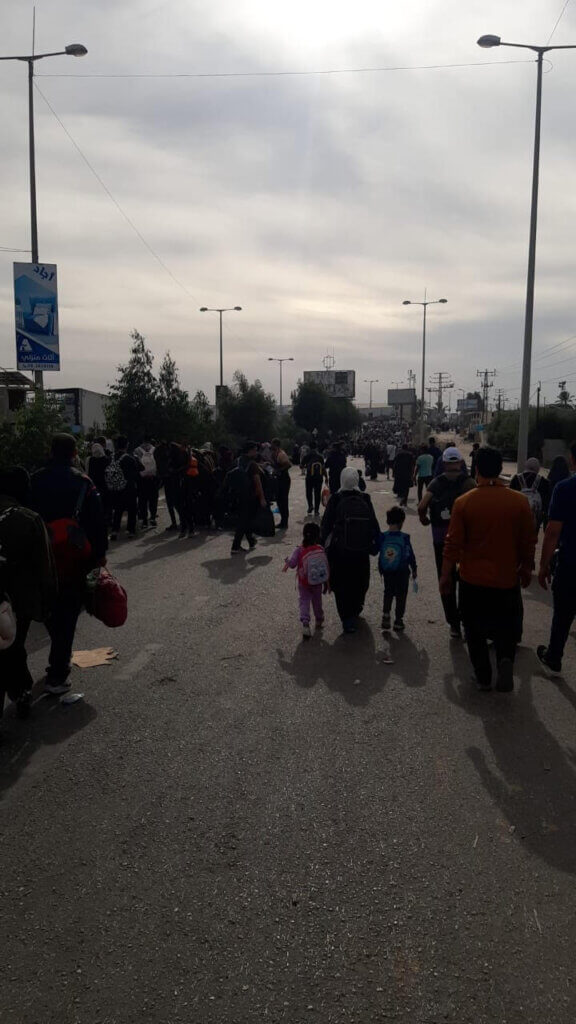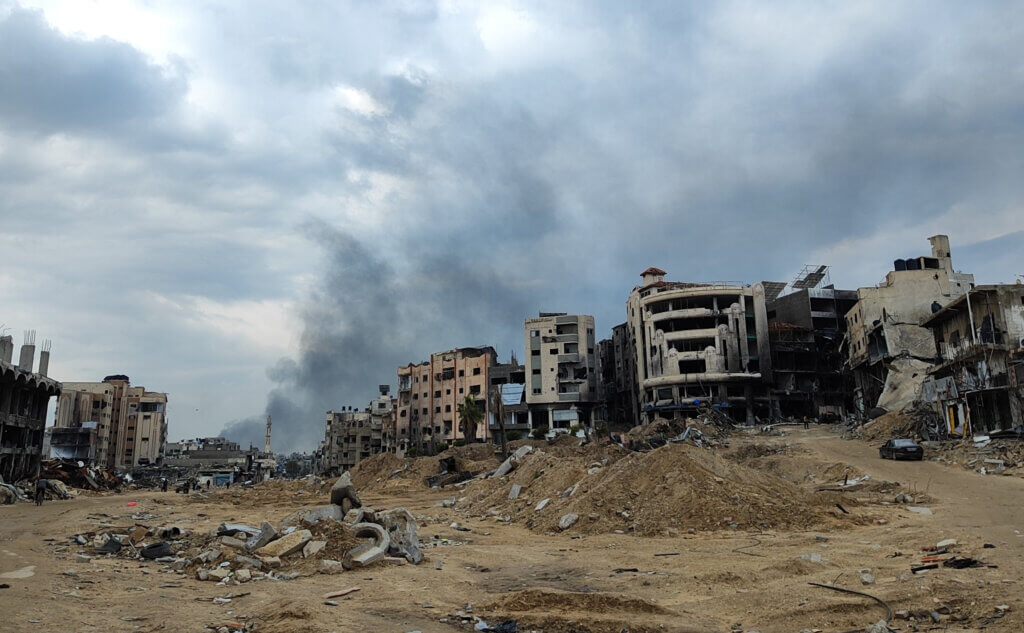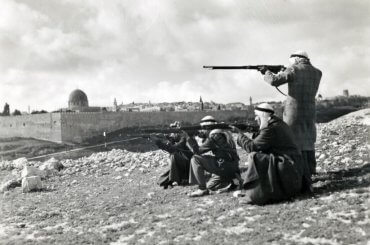Four a.m. seems to be my witching hour, the time past which I cannot sleep. The weak morning light of winter hasn’t yet managed to seep through the blinds, so I know it’s nowhere near sunrise. The silence of my bedside alarm will be unbroken for hours. The furnace hasn’t yet kicked on to the higher morning temperature. There are many reasons to stay buried under the covers, to not move, to pretend that I will return to sleep. But by now I know this is a lie. I am done sleeping. Instead, I will reach for my phone. The movement of my arm will activate the screen and cast just enough light for me to see the room’s corner shadows.
Staring at me will be a photo of my daughter, T, and her four-year-old cousin, Issa. It was taken in July at the home of her uncle in Gaza, when she was visiting her father for the first time in over 10 years. Issa is seated on her lap and they are looking down into the phone she’s holding in her hand. She is wide-eyed, pursing her mouth in a half kiss, her chin resting on his right shoulder. Issa’s little lips are pressed together, barely suppressing a giggle.
I have seen this photo hundreds of times, but I will flick my thumb upwards as quickly as possible to minimize the time I must look at Issa’s doe eyes. I will tap in four numbers – the address of my childhood home – and the screen will unlock.
Then I will undertake the task I know this predawn hour has called me to do. In what feels like a version of Russian roulette, I will call upon WhatsApp to help me figure out if T’s father is still alive in Gaza.
On Friday, October 13, T called me. When I answered I could hear only her sobs. Breathe, habibti, I told her. This was the day the Israelis issued their first go-South-or-else ultimatum to the people of Gaza City, where her father lived. He had just called to give her his email password so she could access his important documents and information, because he did not want to leave. She understood what this meant. She was inconsolable. I packed a few things and drove for two hours to be with her. While I was there, we managed a short WhatsApp video call with H. He asked about her studies and made a dad joke. He urged her not to worry. Then he ended the call the way he always did: Take care of your mom. I love you, baba.

But a month later H did leave Gaza City, after spending several weeks as the only person who had remained in his ten-story apartment building. He made his way to Khan Younis to stay with relatives. H sent pictures from his trek on the main road south. A leaden sky hovers over the heads of the dozens caught in the photo carrying their possessions. There is just enough light filtering through the clouds to cast shadows in the wake of the walkers. A woman walks looking straight ahead holding the hands of two young children, one on either side of her. They, too, have their possessions on their backs in matching pink and blue backpacks adorned with cartoon characters. Probably the same ones they took to school.
H stayed in Khan Younis for just under a month. In early December, he left for Rafah, the southernmost city on the Egyptian border. Israeli tanks had encroached close enough that he could see them from the windows of his house of refuge. It was time to go. Arriving in Rafah, he wrote (emojis in original; translation by Google*):
The scene in Rafah is somewhat different from than in Khan Younis. Rafah was filled with Gazans in its homes and streets. The population crowding in Rafah exceeded all reasonable expectations, especially since the structure of Rafah was not qualified to accommodate these numbers of displaced people. In fact, you find that all schools and public facilities are filled to double their capacity. You will also find that the empty areas are full of improvised tents made of some wood and nylon. You almost do not find an unused warehouse or store that has not been turned into a shelter for displaced people. Everyone who found a roof felt lucky. He is better off than those who remain in the streets or under trees. In any case, it is not only the lack of refuge that is the problem in Rafah, but also the lack of anything. Water, food, firewood, and..and..and.. ad infinitum. The biggest problem is that endurance does not increase as the war continues, but rather begins to decrease when diseases begin to spread due to hunger, cold, or other reasons. Fear of what happened and is happening in northern Gaza and what is happening in Khan Younis increases the confusion of the day, despite the continued relative calm in Rafah. The big question is when will Rafah’s turn come and when will the suffering of the displaced and its residents end. With the hope that relief will approach and the distress will end, I say good night to you.
H’s emojis of choice are hearts and red roses. I think of the roses as his ode to the beautiful gardens he has tended in the 35 years I’ve known him. He would speak proudly of the fruits and vegetables he raised: lemon, almond, and olive trees, eggplant and squash, and pomegranates that seemed to blush when I gazed at them in awe. And while he never bragged about the flowers, I could tell he loved them the most. The fruits and vegetables he watered with a sturdy black hose dragged from place to place. But the flowers – gladiolus, clematis, hibiscus, roses – he always watered with his own hands from an old pitcher he refilled again and again.
In the second week of December, H wrote:
????????????Good morning. We are in the tenth week of the war. The days go by, bringing with them lost lives and property on the one hand, and yielding heroism and steadfastness on the other hand. Israel has called its forces and its method in this war “The Crusher” or “The Mill.” The truth is that war is very close to the action of crushers and mills. Although the planes turn buildings into holes, bulldozers are also required to destroy what is not destroyed and expose everything under the buildings in a desperate attempt to find tunnels. Entire areas in Gaza City have been bulldozed. The process of stripping people, which is intended to humiliate them, is a continuation of the process of stripping stone and earth. The occupation seeks to uproot life from the land, including homes and crops, and deliberately removes history by targeting antiquities and all archaeological buildings.
If life is being uprooted from the land, where, then, does one look for it in Gaza?
Under the rubble.
People return, because they always return, to their smashed homes. Scrambling among the unsteady heaps, they retrieve what the cement and rebar will relinquish: a frying pan, a chair, schoolbooks, a favorite stuffed animal.
But the greatest prizes are retrieved by men in orange vests, the ash of their former city lodged permanently in their beards. They are the ones who pull children from the depths, like midwives birthing a new life. They spend hours calming these pockets of life found amidst mounds of death, encouraging their little ones to breathe – kudh nefes, habibi – as others, like cement surgeons, use saws, drills, and blood-stained hands to extract. Through the narrowest of openings, babies coated in dust and debris emerge, crouched and shivering, first slowly, deliberately, and then in one final energetic burst, to the cheers of their new family. They are washed in water from a plastic bottle; swaddled in a shirt. The bundle is then placed in someone’s arm, and even in the dim light of a cell phone, one sees tears trace a path down his dust-covered cheeks. He rocks and coos and sings to soothe himself as much as the miracle in his arms.
But what raises the eyebrows is that the general feeling of the Palestinians is steadfastness, survival, and enduring hardships. It is true that there are many people who prefer to flee and search for a safe place outside the Gaza Strip, but this is not the case for the majority of people for many reasons. It is not easy to start life again away from a homeland that you love.
Whatever the case, we are fine and hope that this war will soon end. We wish you and everyone safety and longevity.
May it be so.
Notes
* The author has left the translated grammar and syntax mostly intact to preserve the authenticity of H’s voice.



Beautifully written. The Palestinians have become strong and noble in their suffering which is how it should be. It is a testament to courage and integrity and a lesson to the world.
Heart breaking article.
Peaceful neighborly relations is the future to have.
Is it accurate Abbas and Haniyeh are billionaires?